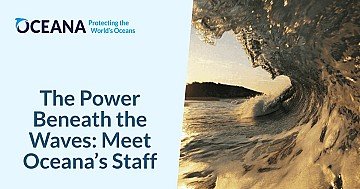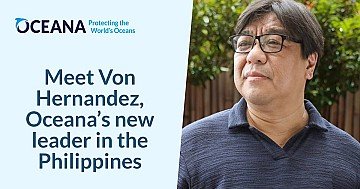James Simon is Oceana’s CEO. Simon was instrumental in establishing Oceana as the world’s leading ocean conservation organization and has helped win more than 300 major policy victories to date. He also helped spearhead the organization’s international expansion.
Simon has extensive experience in policy advocacy, management, and business. Before joining Oceana, he was a management consultant at McKinsey & Company; a political appointee at the Department of Justice; a Senior Attorney at the Natural Resources Defense Council; and an attorney for the City of New York.
Simon’s background has helped him to bring a business-like approach to Oceana’s mission to protect and restore the world’s oceans.
You have worked at Oceana for more than 21 years, first as its president and now as CEO. What led you to dedicate your career to ocean conservation?
JS: I feel fortunate to work in ocean conservation. In the ocean — because ocean-caught fish are the last significant source of wild food — the things we do to maintain ecosystems are the same things we do to increase food abundance for people. So, we have the opportunity not just to make a global, systemic difference by protecting ecosystems and increasing fish abundance generally, but also to improve the livelihoods of coastal communities who benefit from this abundance. I’m honored to take the helm at Oceana and lead conservation efforts that provide a direct benefit to individuals, families, communities, and the ocean.
I got here from a desire to work in public interest law, specifically conservation, civil rights, and social justice. In my first job after law school, I represented the City of New York in cases on many topics, including civil rights and the environment. I was on a team that brought the largest hazardous waste case in the country at the time, which involved illegal dumping in the city’s landfills. I also worked on cases to protect the city’s watershed and ensure a safe drinking supply. One thing I did, in addition to environmental cases, was to help initiate a new program to proactively investigate racial discrimination in housing and to bring lawsuits to stop it.
From there, I was able to join the Natural Resources Defense Council — a great group, by the way — where I led a team suing to stop corporate and government polluters around the country. Next, I had the privilege of working in the Clinton administration as a political appointee in the Environment and Natural Resources Division at the U.S. Department of Justice. We represented the United States in cases involving the oceans, mining, oil and gas drilling, waste disposal, air pollution — just about everything you can imagine related to conservation and the environment.
After gaining experience in business and management at McKinsey & Company, I joined Oceana — then just a start-up — because I wanted to bring a business-like approach to ocean advocacy, including a focus on results and accountability.
Over the past 23 years, Oceana has won more than 300 policy victories for the oceans. What Oceana victory/ies are you most proud of?
JS: That’s like asking me to choose a favorite child (which I won’t do!). Still, a few come to mind. For example: our campaign to change the politics on offshore oil drilling in the United States. In 2008 we went from a “drill, baby, drill” mentality to a bipartisan consensus in 2020 that new offshore oil drilling should cease. We changed the politics by working with coastal businesses and communities and demonstrated that they care about the integrity of the country’s coasts.
Another victory I’m very proud of is one of our very first. We worked with Native Alaskans to protect the north Pacific Ocean surrounding the Aleutian Islands from destructive commercial fishing. Native Alaskans sustain themselves on the animals found in that ocean and getting commercial fishing stopped in those fragile waters in 2005 was a very big win.
More recently: In Peru, we worked with artisanal fishers to protect the first five miles of the coast from industrial fishing to protect that habitat and maintain the livelihoods of small-scale fishers and their families. In Chile, we protected kelp forests and introduced new rules that will help fishers sustainably harvest kelp.
What’s something people might be surprised to learn about you?
JS: I grew up sailing and swimming in Long Island Sound and have had a fundamental interest in the environment since I was a kid. I still love to get on the water, now mostly in the Chesapeake Bay.
How have you seen Oceana grow over the years and, in your opinion, have its priorities evolved?
JS: When we first began, our focus was on conservation, meaning preserving habitats and animals. It wasn’t until about 2012 that we began to understand — as I’ve mentioned — how we can use the oceans not only to preserve ecosystems but also to help feed people.
Not only can the oceans be a source of food in general, but we can bring seafood to people facing food insecurity. For instance, coastal communities in Senegal, Ghana, and Malaysia. Oceana is seeking funding to start campaigns in these countries, where we would work with and for the local people to increase their access to healthy and nutritious fish.
We also now understand and really embrace that the ocean is not only a victim of climate change but also a source for solutions to climate change. For example, if we can keep the carbon under the sea — as opposed to drilling and burning it — we can reduce greenhouse gas emissions and help prevent the worst impacts of the climate crisis.
You’re an attorney by training. Can you tell us about how Oceana uses litigation strategically to help protect the oceans?
JS: We use litigation as one of the five tools in our campaigns: science, communications, organizing, lobbying, and litigation. We look at the important change we’re campaigning to make for the ocean and who can make it — whether it’s the head of government, a government agency, the legislature — and then decide how to persuade that person or body to do the right thing. Sometimes litigation is the best way to do that. It depends on the circumstances, and we’re ready to use any or all tools in any country in which we operate.
At any given time, we have about 14 or so cases moving through the courts in countries around the world. Just as an example, we’ve won legal cases in Chile requiring transparency about the use of antibiotics in salmon farming. We just won a case in the Philippines requiring the National Commission on Solid Waste to issue a list of environmentally harmful substances that need to be banned, which should include plastics. And the list goes on.
JS: Diversity is integral to Oceana’s culture and mission. Since we’re working on country-level policy change, our teams come from at least 12 countries. We place a high value on diversity — people from different backgrounds, different racial and ethnic identities, different educational systems, and different worldviews.
In the U.S., we are working to increase the racial and ethnic diversity of our staff, not only through recruiting but also through retention, which depends on an inclusive workplace. We want all of our colleagues to feel welcome and supported, which includes fostering a culture where people can trust that they can safely raise an issue related to diversity or inclusion and that, if they do, they will be listened to with respect, an open mind, and a commitment to fairness, anti-discrimination, and anti-racism.
External equity is also important to us, which is why in so many of our campaigns we fight to improve social justice for coastal communities and others.
As sea levels and global temperatures rise, so too does climate anxiety. How do you stay hopeful during these times of uncertainty?
JS: Action brings hope. The only thing to do is act.
To quote one of our Board Members, the world-class marine scientist Dr. Daniel Pauly, “the question isn’t whether you’re optimistic or pessimistic. The question is: what are you going to do about it?” I think the best thing to do is get to work. And Oceana has a track record of getting things done. I could not be happier than to be where I am right now, with the chance to be a part of the Oceana team — staff, board, supporters, partners, and allies — making a big difference for people and for the planet.


